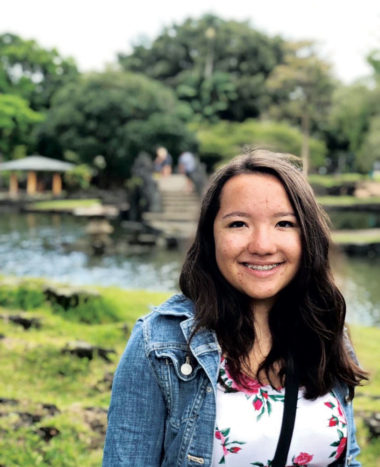
NHS junior Ayla Perez finds remote learning is not a great replacement for in-person theater classes. Photo courtesy of Ayla Perez.
For many Denver parents and their children, it was undoubtedly the March 12 announcement from Denver Public Schools that signaled life as we knew it was about to change radically. DPS’ declaration of an “extended spring break” was followed with a shift to remote learning, signaling tremendous challenges for teachers, administrators, students, and families. The complex web of relationships and interdependencies that center in our schools quickly became apparent, making pre-COVID transportation challenges like juggling carpool and bus schedules seem small by comparison.
Educators and administrators revamped curricula, distributed Chromebooks and other resources, selected distance learning platforms, and communicated information about internet service providers. For the approximately 65% of DPS children and their families who rely on Free and Reduced Lunch (FRL), food security represented a major concern. Essential workers confronted childcare hurdles, and seniors’ hopes for spring prom and graduation dissolved.
Kurt Dennis, Principal of McAuliffe International School, estimates that 98% of students either had internet service or were able to sign up using one of the providers who stepped up to make service more affordable during the pandemic. Others are relying on district-provided hotspots. The bigger issue at McAuliffe was getting devices to students whose families did not have enough technology at home to ensure everyone could be online at the same time; McAuliffe distributed almost 1,000 Chromebooks to its 1,600 students. A few weeks into remote learning, technological hiccups have passed and classes are meeting in Google classrooms and other settings.

Brianna Johnson, also an NHS junior, misses playing softball with her team. Photo courtesy of Brianna Johnson.
Dennis doesn’t anticipate online learning being able to replace the classroom experience post-pandemic, though he does observe that his math team in particular appreciates the interactive program (Desmos) they are using, which allows real-time feedback to students. In terms of timing, the school closures were less inconvenient than they could have been. “We were heading right into the start of state testing,” he says. Since teachers front-load the curriculum, they had already covered the year’s academic standards. Most of the remote learning content is therefore “reinforcing what they’ve already learned this school year with the hopes that when they start in August we’re not seeing any gaps or deficits.”
Ayla Perez, a junior at Northfield High School (NHS), is not enamored of remote learning. Much of her spring class schedule consists of theater classes, which are hard to reproduce in an online format. She will miss the spring musical that is usually a highlight of the school year, though some new experiences are also ahead. Her acting teacher has assigned students to perform a radio drama, an entirely new experience. In terms of college, however, everything is on hold, from campus visits to SATs and other rites of junior year. “I hope they get rid of SATs altogether,” says Perez, echoing the feelings of everyone who ever applied for college.
NHS junior Brianna Johnson, also relieved that she doesn’t have to take the SAT anytime soon, is less concerned about the pandemic’s academic implications than she is about its mental health impact. She speaks from experience, having suffered from depression and anxiety since a very young age: “My social anxiety, it’s a lot better because I don’t have to see people, but my depression has taken a little bit of a toll on me, because I can’t go anywhere to distract myself.” Johnson misses her usual outlets, including her friends and playing softball for NHS. She is finding joy these days in painting, practicing her batting, doing weight training, and listening to her grandparents’ old vinyl and cassettes.
NHS Principal Amy Bringedahl notes that some of her students are facing additional stressors due to the economic dislocation so many families are experiencing; some are working full-time to help support their families even as they navigate multiple remote learning platforms. Though online learning may help reduce the social isolation, it cannot replace the daily connections in-person learning provides, says Bringedahl. Like senior classes everywhere, NHS seniors will also miss out on cherished traditions like senior skip day, senior prank, senior BBQ, and prom. A virtual graduation is planned for May, and DPS is finalizing plans for in-person commencement ceremonies across the district in August.
In the meantime, the once-noisy halls at NHS, McAuliffe and across the district are empty. “It’s like the building was evacuated on a moment’s notice—teachers’ lessons are still on the boards, posters for events that were to have happened this spring are still on the wall, kids’ personal items are lying around,” says Dennis. Educators are already thinking about how to best transition students from the very long “break” into classrooms when face-to-face learning resumes. That transition is sure to bring a whole new meaning and joy to back-to-school for everyone.
For information about meals and supplemental food offered by DPS, go to: https://www.dpsk12.org/coronavirus/food-distribution/ for pick-up locations and hours.




0 Comments